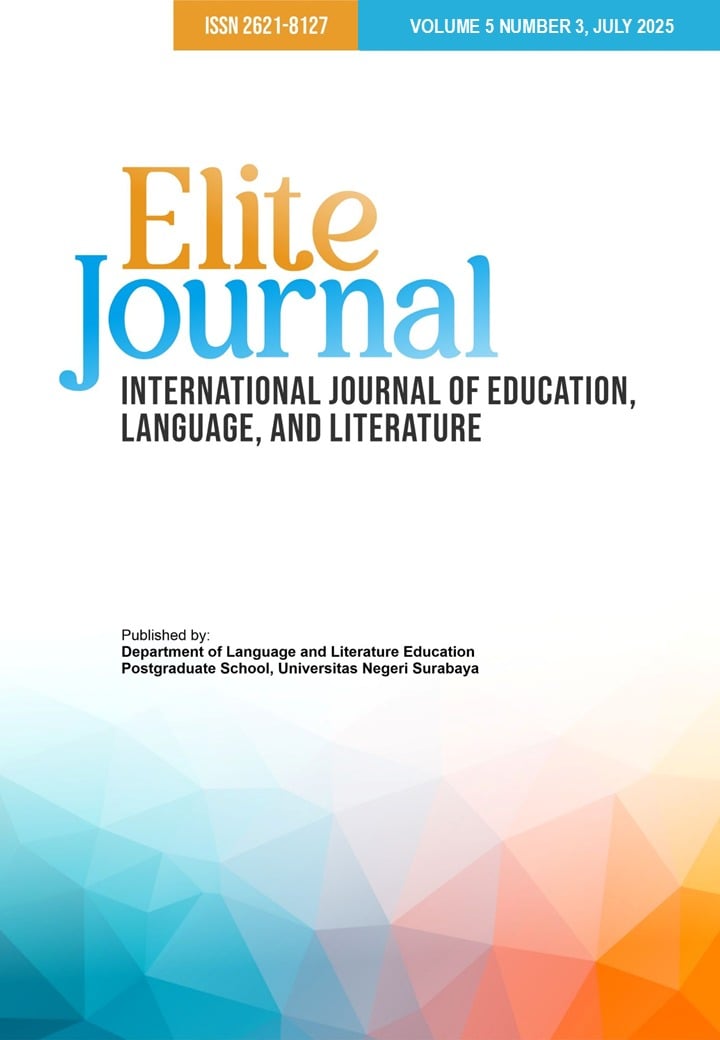DIGITAL ESCAPISM: EXPLORING THE ROLE OF BEING K-POP FANS FOR YOUNG ADULT WOMEN
DOI:
https://doi.org/10.26740/elitejournal.v5n3.p52-61Keywords:
Coping Mechanism, Digital Escapism, K-PopAbstract
This study aims to explore how digital escape through K-pop serves as a coping mechanism for young adult women facing stress and personal challenges. Using content analysis and in-depth interviews with five female participants aged 20 to 25, this study focuses on individual experiences in accessing K-pop content, interacting in online communities, and developing hobbies related to K-pop, such as fan art and fan fiction. This research employs Abraham Maslow's hierarchy of needs theory as its theoretical framework, with an emphasis on the levels of love and belonging and self-esteem. The findings reveal that engagement in the K-pop world provides a safe and supportive space for participants to express themselves, build their identities, and receive emotional support online. This study highlights how popular culture and the digital context can function as significant coping mechanisms in the daily lives of young adult women. This study contributes to contemporary cultural studies and psychology by demonstrating that the K-pop world can serve as an alternative space for fulfilling the emotional and psychological needs of young adult women.
References
Baudrillard, J. (1998). Jean baudrillard. Simulacra and simulations. Jean Baudrillard, Selected Writings, 1–17. http://scholar.google.com/scholar?hl=en&btnG=Search&q=intitle:Jean+Baudrillard+Simulacra+and+Simulations#0
Dajches, L. (2022). Finding the self through others: exploring fandom, identification, and self-concept clarity among U.S. adolescents. Journal of Children and Media, 16(1), 107–116. https://doi.org/10.1080/17482798.2021.1922474
Hing-Po Lam, V. (2020). Evaluation of Implementation of Maslow’s Hierarchy of Needs to Fulfil the Needs of Freelance Journalist and Adaptation of Psychological Contract into Employment Relationship in Hong Kong. Randwick International of Social Science Journal, 1(2), 107–112. https://doi.org/10.47175/rissj.v1i2.50
Huang, L. (2024). e Young Researcher “ I can x him ”: A mixed-method analysis of psychological e ects of parasocial relationships in adolescent K- Pop fans I Can Fix Him : 8(1), 120–134.
Kilian, M. (2023). Exploring the Motivations and Therapeutic Benefits of Fandom and Fanart Online Communities: A Literature Review. https://digitalcommons.lesley.edu/expressive_theses/701/%0Ahttps://digitalcommons.lesley.edu/cgi/viewcontent.cgi?article=1713&context=expressive_theses
Lou, S. R. (2024). K-Pop as a Stress-Relief Mechanism Exploring Its Emotional Impact on Filipino Youth. 3(12). https://doi.org/10.56397/JRSSH.2024.12.01
Mohd Zaliridzal Zakaria, Abdul Rashid Abdul Aziz, Nurhafizah Mohd Shukor, Muhammed Fauzi Othman, & Mohd Azhar Abd. Hamid. (2021). Coping Mechanism Towards Academic Stress Among Students: An Analysis from Islamic Perspective. Ulum Islamiyyah, 33(1), 31–53. https://doi.org/10.33102/uij.vol33no1.194
Pettijohn, T. F. (1996). By Maslow ’ S Hierarchy of Needs ’. 759–762.
Reed-Fitzke, K., Withers, M. C., Ferraro, A. J., Lucier-Greer, M., & Duncan, J. M. (2021). A Growth Curve Analysis of Self-Esteem and Depressive Symptomatology Throughout Emerging Adulthood: The Role of Family. Emerging Adulthood, 9(2), 91–103. https://doi.org/10.1177/2167696818813286
Downloads
Published
How to Cite
Issue
Section
License
Copyright (c) 2025 Putri Rahmadani

This work is licensed under a Creative Commons Attribution 4.0 International License.
 Abstract views: 271
,
Abstract views: 271
, PDF Downloads: 437
PDF Downloads: 437





